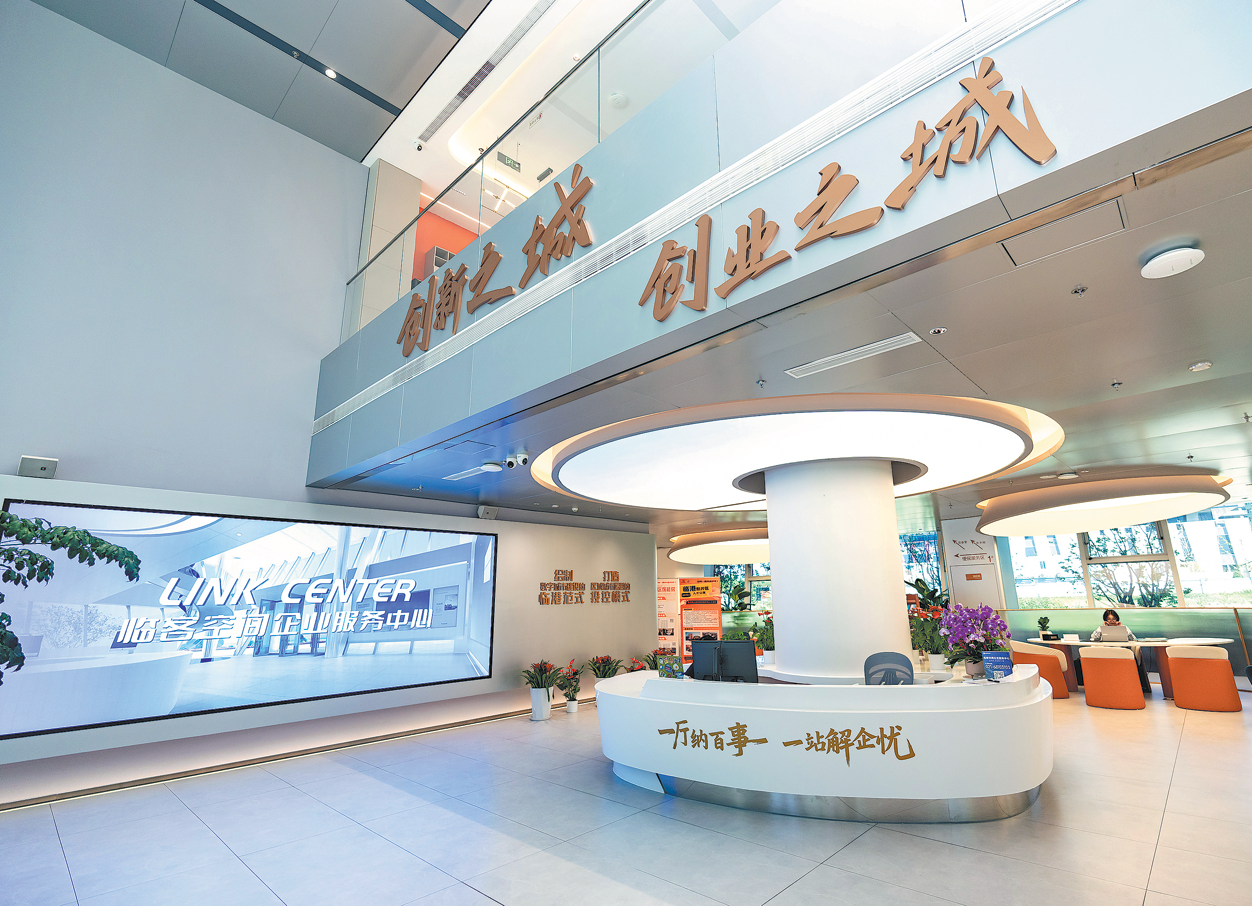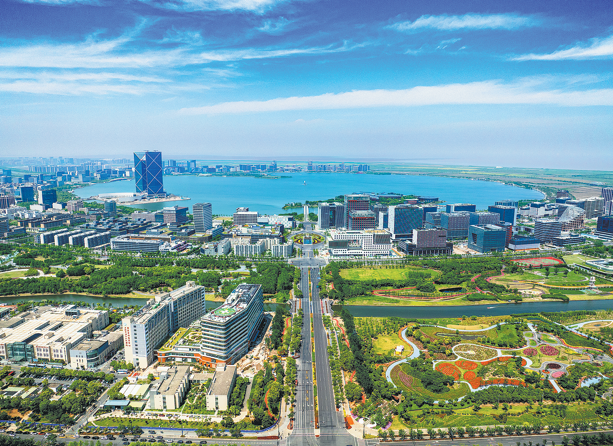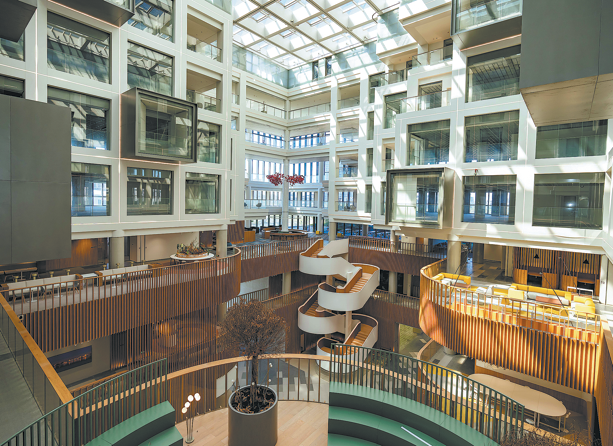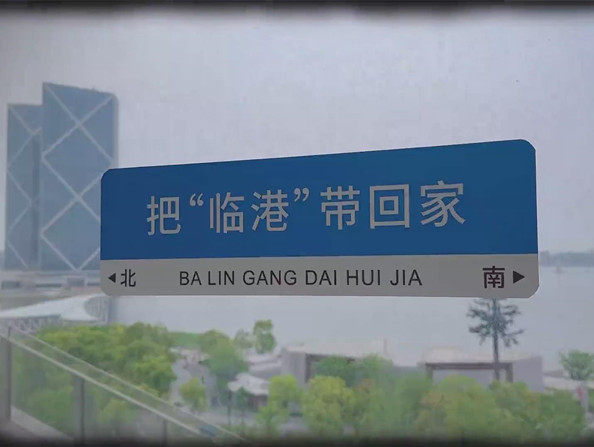Lin-gang Special Area offers support to startups
The Lin-gang Special Area of China (Shanghai) Pilot Free Trade Zone is capitalizing on its unique advantages in science and technology to provide comprehensive support for the development of innovative ideas and entrepreneurial ventures. Emerging as a key innovation hub, Lin-gang aims to become a premier destination for tech-driven entrepreneurship.
Recently, the administrative committee of the Lin-gang Special Area revealed its strategic plan for cultivating a robust sci-tech innovation ecosystem, highlighting significant achievements and outlining a blueprint for the integrated development of technology, industry and talent.
Lin-gang aims to become a leading sci-tech innovation hub for Shanghai and the nation. Within the next five years, it plans to become a pivotal center for the transformation of Shanghai's sci-tech achievements; a key gathering place for emerging industries; a testing ground for new business models; and an ideal environment for young entrepreneurs.

Link Center, a service center for enterprises in the Lin-gang Special Area of China (Shanghai) Pilot Free Trade Zone. CHINA DAILY
Central to this vision is the "innovation community plus entrepreneurs' home" system, which fosters a dynamic ecosystem where large communities support industries and smaller entities incubate projects, according to the administrative committee.
The innovation community refers to specific areas with defined industrial focuses, densely packed with innovation and entrepreneurship elements, and equipped with comprehensive functions for the transformation and incubation of sci-tech outcomes.
At present, Lin-gang has built six such communities, including the Dishui Lake AI Innovation Harbor, 103 Science & Innovation Headquarters Bay, and the World Laureates Association Science Community.
These communities not only aggregate resources such as research institutions, concept verification centers, incubators, low-cost office carriers, and professional sci-tech service agencies, but also provide living facilities such as civic squares, cinemas, commercial streets, talent apartments, and kindergartens.
The "entrepreneurs' home" concept offers affordable entrepreneurial spaces for startups, addressing their needs for resource connectivity. It provides a supportive environment where startups can thrive without the burden of high overhead costs.
Bridging research, industry
Lin-gang has carved a distinctive path in linking basic research with industrial application. It has attracted a group of world-class scientists and research teams focused on fundamental research in areas such as mathematics, physics, materials science, and brain science, aiming to overcome significant technical bottlenecks.

A view of the Lin-gang Special Area. CHINA DAILY
These top scientists are "using the smartest brains to develop the most competitive industries, define the most cutting-edge achievements, and build Lin-gang into a leading science and innovation city", said a spokesperson of the administrative committee.
The transformation of scientific achievements is aided through the top scientists' community and forums, which integrate local resources in Lin-gang, fosters connections between local enterprises and top scientists, and accelerates the local application of scientific breakthroughs.
Local research institutions participate in these forums, showcasing the integration of local scientific research and education.
Additionally, laboratory innovations must ultimately be tested through industrial applications, and the transformation of sci-tech achievements into tangible productive forces relies heavily on the development and implementation of application scenarios.
"Lin-gang offers a unique landscape of industrial application scenarios, providing an excellent foundation for testing and advancing laboratory innovations," the spokesperson said.
The area now hosts 15 leading enterprises in sectors such as intelligent new energy vehicles, integrated circuits, and high-end equipment. They offer shared application scenarios, technical needs, and procurement orders that serve as testing platforms for laboratory outcomes.
At the same time, mature enterprises possess numerous technologies that require collaborative efforts from leading laboratories.
By leveraging the innovation community, these enterprises can attract world-class research talent, fostering a collaborative model where "enterprises pose challenges and labs provide solutions". This approach accelerates the transition of technology from the laboratory to the production line.
Lin-gang plans to develop ecological communities around top labs, such as a brain-computer chip and drug innovation community supported by the Lin-gang Laboratory and a satellite development community based on the Innovation Academy for Microsatellites, to promote the local industrialization of sci-tech outcomes.
Tailored assistance
Lin-gang offers customized support plans for innovation entities at various stages. For mature enterprises seeking industry chain coordination and ecosystem building, the area provides support through various special policies, the cultivation of chain-leading enterprises, and coordinated industry chain procurement to foster a robust industrial ecosystem.
For startups, Lin-gang offers low-cost entrepreneurial space, such as free apartments for talented workers, affordable office spaces, and other benefits for talents. It also plans to introduce a 500,000-yuan ($70,167) startup fund policy for young entrepreneurs.
Furthermore, the area provides accompanying entrepreneurial services to address the immediate needs of startups.

An artificial intelligence scientific center in the Lin-gang Special Area. CHINA DAILY
According to the administrative committee, startups typically possess technology, enthusiasm, and early-stage funding. However, they often lack personnel to navigate policies, secure resources, and address employee welfare. Additionally, many returning talents are unfamiliar with the domestic environment.
The services provided encompass policy applications, capital acquisition, talent recruitment, and even education for employees' children. "We stand with enterprises like family, enhance entrepreneurial experiences with the welcoming environment of Lin-gang Science and Innovation City, and boost development competitiveness through its appeal," the spokesperson said.
Under these initiatives, the Lingang Science and Innovation City has achieved notable results. In basic innovation, for example, the area has established three high-energy labs including Lin-gang Laboratory, two major sci-tech infrastructure projects under construction, and two national major projects. It is also promoting the construction of two city-level labs.
In applied innovation, Lin-gang has leveraged the strengths of universities and research institutes including Peking University and Fudan University to establish 14 high-level sci-tech innovation platforms.
It has also attracted a number of new research institutions such as the Asia-Pacific Typhoon Collaborative Research Center and the Shanghai Institute for Advanced Algorithms Research, among which six were recognized as municipal-level new research institutions.
The scale of cutting-edge industries in Lin-gang has expanded rapidly. In 2024, the output value of local industrial enterprises above designated size reached 423 billion yuan, accounting for 10 percent of the city's total. The four core industries grew by more than 60 percent year-on-year, becoming a new engine of economic growth, and 124 international high-level talents were introduced that year.
Sci-tech achievements continue to emerge, with research and development expenditure in 2023 accounting for 6.09 percent of the city's GDP.
Notably, the 300-megawatt F-class heavy-duty gas turbine prototype, featuring maximum power and top-level technical performance, independently developed by China United Gas Turbine Technology, was rolled off the assembly line in Lin-gang in 2024.
Shanghai also witnessed an increase in high-growth enterprises in 2024, with eight being recognized as the city's manufacturing single champions. Another 36 were identified as specialized, sophisticated, and innovative "little giants".
Systemic reforms and innovations were continuously advanced in 2024, resulting in 166 pioneering innovation cases in areas such as offshore trade, cross-border finance, and cross-border healthcare, including 79 that achieved national-level recognition.
Looking ahead, Lin-gang's industrial focus will become more concentrated and strategic. In the integrated circuits sector, efforts will target addressing shortcomings such as lithography, advanced processes, silicon photonics chips, and design software.
For intelligent new energy vehicles, the area will emphasize developing industry chains related to automotive electronics and software.
In civil aviation, the focus will be on attracting and nurturing key projects, including aero-engines and airframe materials. In the high-end equipment sector, attention will be given to fostering manufacturing industries such as marine equipment and energy storage. Meanwhile, in the digital economy, the aim will be to develop ecosystems around digital annotation and the global expansion of Chinese culture.
Moreover, Lin-gang is planning to bolster its competitiveness in scientific and technological innovation by investing in future industries.
The area will concentrate on developing advanced energy solutions such as nuclear fusion, next-generation intelligent terminals, and cutting-edge space technologies including space-air computing, satellites, and general aviation.
Additionally, it will focus on future health industries, exploring innovations such as brain-computer interfaces and artificial intelligence-enabled drug discovery.
-
Address No 200 Shengang Avenue, Pudong New Area, Shanghai, China
-
Zip Code 201306
-
TEL +86-21-68283063
-
FAX +86-21-68283000




 Follow NUA international students through cosmopolitan Lin-gang
Follow NUA international students through cosmopolitan Lin-gang
 Discover a cosmopolitan Lin-gang with SHCM international students
Discover a cosmopolitan Lin-gang with SHCM international students
 Explore Lin-gang with international students from Fudan University
Explore Lin-gang with international students from Fudan University


